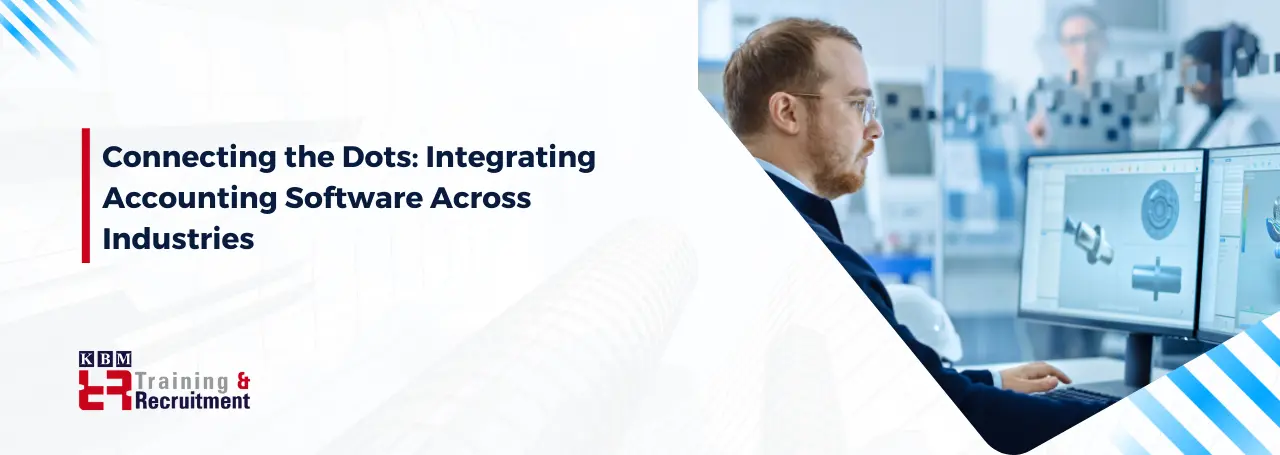In today's business landscape, integrating accounting software across industries has become crucial for optimising financial processes and driving efficiency.As businesses navigate complex operations, the seamless connection between accounting software and other systems enhances decision-making, improves customer relationships, streamlines supply chain management ensures regulatory compliance, and enables scalability.
In this comprehensive exploration, we'll explore the significance of integrating accounting software across industries, exploring its multifaceted benefits and critical considerations for successful implementation.
Streamlining Financial Processes
Integrating accounting software with corporate systems like Enterprise Resource Planning (ERP), Customer Relationship Management (CRM), and Inventory Management streamlines financial processes by automating data transfer, eliminating duplicate entries, and ensuring consistency.
Businesses can seamlessly manage transactions, track expenses, and generate invoices, saving time and reducing errors. Moreover, the centralised platform provides a holistic view of financial data, facilitating efficient monitoring and analysis of financial performance.
Enhancing Decision-Making
Integrated accounting software gives businesses real-time access to critical financial insights, enabling informed decision-making and strategic planning. Companies can analyse trends, forecast outcomes, and identify growth opportunities by consolidating information from various sources.
With comprehensive financial visibility, stakeholders can make timely decisions, allocate resources effectively, and respond swiftly to market changes, gaining a competitive edge in their respective industries.
Improving Customer Relationships
Integrating accounting software with CRM systems enables businesses to understand customer interactions and financial transactions comprehensively.
By tracking sales, invoices, payments, and communications in a unified platform, companies can personalise customer interactions, anticipate needs, and deliver exceptional service.
This deeper insight fosters stronger customer relationships, enhances loyalty, and drives repeat business, contributing to long-term success and profitability.
Optimising Supply Chain Management
Integrated accounting software facilitates seamless coordination and communication within the supply chain, enhancing efficiency and reducing costs.
By integrating with procurement, inventory, and logistics systems, businesses can track orders, manage inventory levels, and streamline procurement processes.
This optimisation of the supply chain ensures timely delivery of goods and services, minimises stockouts and overstocking, and improves overall supply chain performance, benefiting businesses across industries.
Ensuring Regulatory Compliance
Integrated accounting software ensures regulatory compliance by centralising financial data and automating compliance-related processes.
With built-in features for tax compliance, audit trails, and financial reporting, businesses can streamline compliance efforts and mitigate non-compliance risk.
By adhering to industry regulations and standards, businesses safeguard their reputation, avoid penalties, and maintain trust with stakeholders, ensuring long-term sustainability and success.
Scalability and Adaptability
Integrated accounting software offers scalability and adaptability to accommodate businesses' evolving needs as they grow and expand.
Whether scaling operations, adding new functionalities, or integrating third-party applications, companies can seamlessly adapt their financial systems to meet changing requirements.
This scalability ensures businesses remain agile and responsive to market dynamics, emerging trends, and evolving customer needs, positioning them for sustained growth and competitiveness.
Challenges and Considerations
While the benefits of integrating accounting software across industries are significant, businesses must navigate challenges and considerations to ensure successful implementation.
These include the initial investment in software and infrastructure, data migration and integration complexities, user training and adoption, and ongoing maintenance and support.
Moreover, businesses must prioritise data security, privacy, and compliance to safeguard sensitive financial information and maintain regulatory compliance across industries.
The Bottom Line
Integrating accounting software across industries is imperative for optimising financial processes, enhancing decision-making, improving customer relationships, streamlining supply chain management, ensuring regulatory compliance, and enabling scalability and adaptability.
By seamlessly connecting accounting software with other business systems and processes, businesses can unlock new opportunities for growth, innovation, and competitiveness in today's interconnected business environment.
As companies adopt digital transformation, integrating accounting software will be increasingly critical in driving efficiency, agility, and success across industries.






















